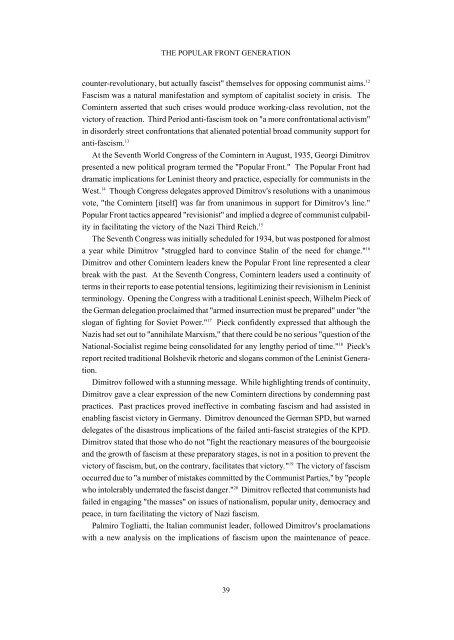Joel A Lewis Youth Against Fascism.pdf
Joel A Lewis Youth Against Fascism.pdf
Joel A Lewis Youth Against Fascism.pdf
Create successful ePaper yourself
Turn your PDF publications into a flip-book with our unique Google optimized e-Paper software.
THE POPULAR FRONT GENERATION<br />
counter-revolutionary, but actually fascist" themselves for opposing communist aims. 12<br />
<strong>Fascism</strong> was a natural manifestation and symptom of capitalist society in crisis. The<br />
Comintern asserted that such crises would produce working-class revolution, not the<br />
victory of reaction. Third Period anti-fascism took on "a more confrontational activism"<br />
in disorderly street confrontations that alienated potential broad community support for<br />
anti-fascism. 13<br />
At the Seventh World Congress of the Comintern in August, 1935, Georgi Dimitrov<br />
presented a new political program termed the "Popular Front." The Popular Front had<br />
dramatic implications for Leninist theory and practice, especially for communists in the<br />
West. 14 Though Congress delegates approved Dimitrov's resolutions with a unanimous<br />
vote, "the Comintern [itself] was far from unanimous in support for Dimitrov's line."<br />
Popular Front tactics appeared "revisionist" and implied a degree of communist culpability<br />
in facilitating the victory of the Nazi Third Reich. 15<br />
The Seventh Congress was initially scheduled for 1934, but was postponed for almost<br />
a year while Dimitrov "struggled hard to convince Stalin of the need for change." 16<br />
Dimitrov and other Comintern leaders knew the Popular Front line represented a clear<br />
break with the past. At the Seventh Congress, Comintern leaders used a continuity of<br />
terms in their reports to ease potential tensions, legitimizing their revisionism in Leninist<br />
terminology. Opening the Congress with a traditional Leninist speech, Wilhelm Pieck of<br />
the German delegation proclaimed that "armed insurrection must be prepared" under "the<br />
slogan of fighting for Soviet Power." 17 Pieck confidently expressed that although the<br />
Nazis had set out to "annihilate Marxism," that there could be no serious "question of the<br />
National-Socialist regime being consolidated for any lengthy period of time." 18 Pieck's<br />
report recited traditional Bolshevik rhetoric and slogans common of the Leninist Generation.<br />
Dimitrov followed with a stunning message. While highlighting trends of continuity,<br />
Dimitrov gave a clear expression of the new Comintern directions by condemning past<br />
practices. Past practices proved ineffective in combating fascism and had assisted in<br />
enabling fascist victory in Germany. Dimitrov denounced the German SPD, but warned<br />
delegates of the disastrous implications of the failed anti-fascist strategies of the KPD.<br />
Dimitrov stated that those who do not "fight the reactionary measures of the bourgeoisie<br />
and the growth of fascism at these preparatory stages, is not in a position to prevent the<br />
victory of fascism, but, on the contrary, facilitates that victory." 19 The victory of fascism<br />
occurred due to "a number of mistakes committed by the Communist Parties," by "people<br />
who intolerably underrated the fascist danger." 20 Dimitrov reflected that communists had<br />
failed in engaging "the masses" on issues of nationalism, popular unity, democracy and<br />
peace, in turn facilitating the victory of Nazi fascism.<br />
Palmiro Togliatti, the Italian communist leader, followed Dimitrov's proclamations<br />
with a new analysis on the implications of fascism upon the maintenance of peace.<br />
39

















